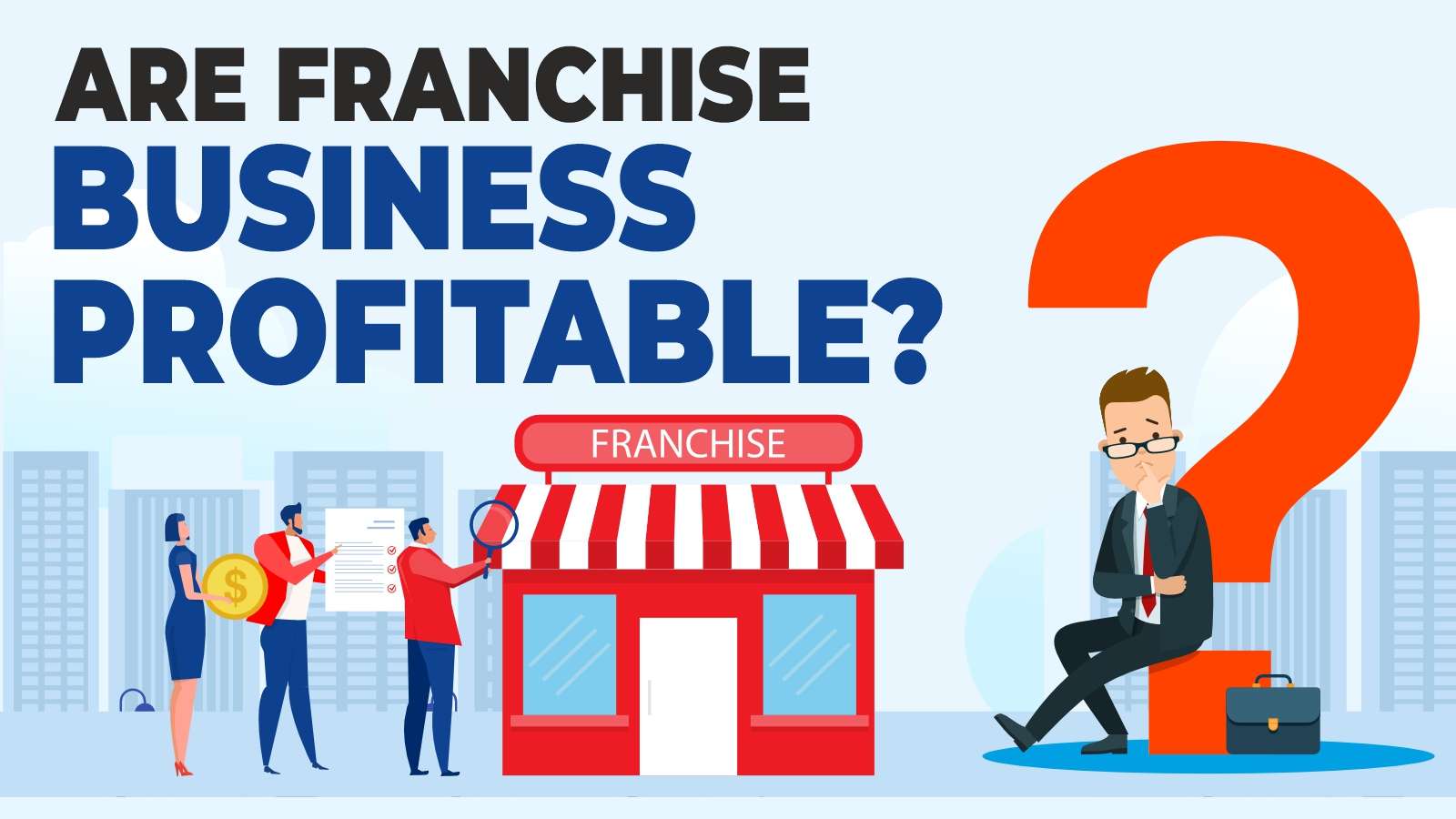Are franchise business profitable?

Share Blog:
The Profitability of Franchise Businesses: Separating Fact from Fiction
The allure of franchise businesses is undeniable. With a recognized brand name, established operations, and support from the franchisor, it's no wonder many entrepreneurs consider franchising a safer bet than starting a business from scratch. But is the grass really greener on the franchise side? While some franchisees enjoy significant profits, others struggle to break even. So, what's the real story behind franchise profitability? In this post, we'll separate fact from fiction, exploring the myths and realities of franchise businesses to help you make an informed decision about your entrepreneurial future.
I. Debunking Common Myths
When considering a franchise business, it's essential to separate fact from fiction. Let's dive into three common myths and uncover the truth:
Myth 1: Franchises are a guaranteed success
While franchises have a higher success rate than independent businesses, success is not automatic. Factors like:
- Location and market demand
- Effective marketing and advertising
- Operational efficiency and management
- Adapting to changing consumer preferences
still play a crucial role in determining success. Even with a proven business model, hard work and dedication are required to thrive.
Myth 2: Franchises are only for small businesses
Franchises come in various sizes and industries, from:
- Small, home-based operations like consulting or tutoring services
- Medium-sized businesses like restaurants or retail stores
- Large, multi-unit enterprises like hotel chains or convenience stores
Franchising is a business model, not a size designation. It offers scalability and flexibility for entrepreneurs with varying ambitions and resources.
Myth 3: Franchises are too restrictive
While franchises have rules and guidelines to ensure consistency and quality across locations, many franchisors also offer:
- Support and training programs
- Flexibility in operations and marketing
- Opportunities for feedback and input
- Collaborative relationships between franchisees and franchisors
These aspects allow franchisees to benefit from the brand's reputation and expertise while still having autonomy to run their business effectively.
By understanding the realities behind these myths, you can make a more informed decision about whether franchising aligns with your entrepreneurial goals and aspirations.
II. Understanding the Franchise Business Model
The franchise business model is a strategic partnership between two parties: the franchisor (the parent company) and the franchisee (the individual or group operating the franchise). This model offers a framework for entrepreneurs to replicate a successful business concept, leveraging the franchisor's expertise, resources, and brand recognition.
Overview of the Franchise ModelIn a franchise arrangement, the franchisor grants the franchisee the right to operate a business using their:
- Trade name and trademark
- Business system and processes
- Proprietary products or services
- Marketing and advertising strategies
In return, the franchisee pays an initial fee and ongoing royalties to the franchisor, as well as agreeing to adhere to the franchisor's guidelines and standards.
Types of Franchise ArrangementsThe different types of franchise arrangements:
-
Single-Unit Franchise
- The franchisee operates a single franchise location
- Typically the most common type of franchise arrangement
- Franchisee pays an initial fee and ongoing royalties to the franchisor
- Franchisor provides support and training for the single location
- Franchisee is responsible for the day-to-day operations of the single unit
-
Multi-Unit Franchise
- The franchisee operates multiple franchise locations
- Often requires a higher initial investment and ongoing royalties
- Franchisor may offer discounts on fees for multiple units
- Franchisee has more control over operations and marketing across multiple locations
- Franchisor provides support and training for all locations
-
Area Development Franchise
- The franchisee has the rights to develop and operate multiple franchises within a specific geographic area
- Typically requires a higher initial investment and ongoing royalties
- Franchisee has the authority to develop and operate multiple locations within the designated area
- Franchisor provides support and training for all locations within the area
- Franchisee is responsible for recruiting and training staff for all locations
-
Master Franchise
- The franchisee has the rights to sub-franchise and develop a specific territory or region
- Typically requires a significant initial investment and ongoing royalties
- Franchisee has the authority to recruit and train sub-franchisees within the designated territory
- Franchisor provides support and training for the master franchisee and sub-franchisees
- Master franchisee is responsible for recruiting and training staff for all sub-franchisees
-
Joint Venture Franchise
- A partnership between the franchisor and franchisee to develop and operate a franchise together
- Both parties share ownership, control, and profits
- Typically used for large-scale projects or new market development
- Franchisor and franchisee share responsibilities and decision-making authority
-
Conversion Franchise
- An existing business converts to a franchise, adopting the franchisor's brand and system
- Typically requires a lower initial investment than starting a new franchise
- Franchisor provides support and training to convert the existing business
- Franchisee benefits from the existing customer base and infrastructure
-
Co-Branding Franchise
- A partnership between two or more brands to create a new franchise concept
- Both brands share ownership, control, and profits
- Typically used for new product or service development
- Both brands share responsibilities and decision-making authority
Each type of franchise arrangement offers benefits and challenges, depending on the entrepreneur's goals, resources, and experience. It's essential to carefully consider these options and seek professional advice before making a decision.
III. Factors Influencing Profitability
Factors influencing profitability in a franchise business:
Initial Investment and Startup Costs
- The initial fee paid to the franchisor to secure the franchise rights
- Costs associated with setting up the business, such as equipment, inventory, and leasehold improvements
- Working capital required to cover initial operating expenses
- Total investment can range from tens of thousands to millions of dollars
Ongoing Fees and Royalties
- Royalty fees paid to the franchisor as a percentage of gross sales (typically 4-12%)
- Advertising fees to support national and local marketing campaigns
- Technology fees for software and system support
- Ongoing training and support fees
- These fees can range from 5-20% of gross sales
Market Demand and Competition
- The level of demand for the product or service in the local market
- The number and strength of competitors in the market
- The franchise's market share and brand recognition
- The ability to differentiate the business from competitors
Operational Efficiency and Management
- The ability to manage labor costs, inventory, and supply chain effectively
- The efficiency of business processes and systems
- The ability to control costs and maintain profitability
- The skills and experience of the management team
Additional factors that can influence profitability include:
- Location and site selection
- Marketing and advertising efforts
- Product or service pricing and margins
- Employee training and retention
- Supplier relationships and negotiations
- Economic and regulatory conditions
By carefully considering these factors, franchisees can better understand the potential profitability of their business and make informed decisions to drive success.
IV. Profitability in Different Franchise Industries
Fast Food and Restaurants:
The fast food and restaurant industry is one of the most popular franchise sectors, with many well-known brands like McDonald's, Subway, and Domino's Pizza. Profitability in this industry depends on factors like location, menu offerings, pricing, and operational efficiency. Successful franchisees in this sector typically have high volumes of customers, effective supply chain management, and strong marketing strategies. Average profit margins range from 5-15%, with some franchises reporting higher margins due to strong brand recognition and efficient operations.
Retail and Hospitality:
The retail and hospitality industry includes franchises like convenience stores, clothing stores, and hotels. Profitability in this sector depends on factors like foot traffic, product offerings, pricing, and customer service. Successful franchisees in this sector typically have strategic locations, effective inventory management, and strong customer relationships. Average profit margins range from 5-12%, with some franchises reporting higher margins due to strong brand loyalty and effective marketing.
Service-Based Franchises:
Service-based franchises, such as cleaning and landscaping services, rely on providing expertise and labor to customers. Profitability in this sector depends on factors like labor costs, equipment expenses, and customer acquisition. Successful franchisees in this sector typically have efficient operations, strong customer relationships, and effective marketing strategies. Average profit margins range from 10-20%, with some franchises reporting higher margins due to strong brand recognition and efficient operations.
It's important to note that profitability can vary widely within each industry, depending on factors like location, management expertise, and market conditions. Additionally, franchisees should carefully review the franchise agreement, financial projections, and support offered by the franchisor before investing in a franchise opportunity.
V. Real-Life Examples of Profitable Franchises
Here are some real-life examples of profitable franchises across various industries, along with their success stories and experiences:
McDonald's - Fast Food
- Success story: John, a McDonald's franchisee in California, increased his sales by 25% within a year by implementing effective marketing strategies and renovating his restaurant.
- Interview quote: "The McDonald's brand and support system have been instrumental in my success. I've been able to grow my business and provide jobs for my community."
7-Eleven - Convenience Store
- Success story: Sarah, a 7-Eleven franchisee in Texas, increased her profits by 15% within six months by optimizing her inventory management and improving customer service.
- Case study: Sarah's store was recognized as one of the top-performing 7-Eleven locations in the region, with high sales and customer satisfaction ratings.
Anytime Fitness - Fitness
- Success story: Mark, an Anytime Fitness franchisee in Florida, grew his membership by 50% within a year by offering personalized training programs and building a strong community.
- Interview quote: "The Anytime Fitness model and support have allowed me to focus on what I love - helping people achieve their fitness goals."
Subway - Fast Food
- Success story: Emily, a Subway franchisee in New York, increased her sales by 12% within a year by introducing new menu items and improving her restaurant's ambiance.
- Case study: Emily's Subway location was recognized as one of the top-performing locations in the region, with high customer satisfaction ratings.
Servpro - Cleaning and Restoration
- Success story: David, a Servpro franchisee in Illinois, grew his business by 25% within a year by providing exceptional customer service and expanding his services to include disaster restoration.
- Interview quote: "The Servpro brand and support have given me the tools and resources to build a successful business and make a difference in my community."
Conclusion
Franchise businesses offer a unique opportunity for entrepreneurs to start a business with a proven model, brand recognition, and support from the franchisor. While there are costs and fees associated with franchising, the potential for profitability is significant. Entrepreneurs who carefully research and select the right franchise opportunity, manage their operations effectively, and leverage the support and resources provided by the franchisor can achieve their business goals and enjoy a profitable and sustainable future.
For Franchisee Enquiry, Call: 6352177288.
Also Read...





